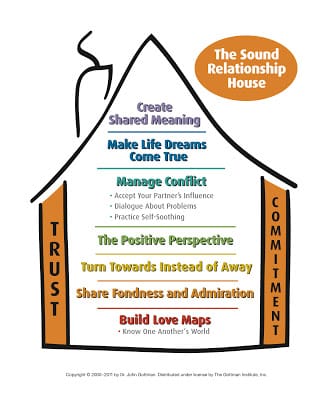 The fourth story of the Sound Relationship House is The Positive Perspective. Positive Sentiment Override (PSO) determines a lot in the relationship, including problem-solving and repair attempts during conflict resolution. If the first three levels of the Sound Relationship House are not working, then people may find themselves in the Negative Sentiment Override NSO) in which even neutral or positive messages are perceived as negative. People in the NSO their partner as an adversary, not a friend. It is not possible to change NSO to PSO, except by changing the quality of the couple’s friendship by using the first three levels of the Sound Relationship House.
The fourth story of the Sound Relationship House is The Positive Perspective. Positive Sentiment Override (PSO) determines a lot in the relationship, including problem-solving and repair attempts during conflict resolution. If the first three levels of the Sound Relationship House are not working, then people may find themselves in the Negative Sentiment Override NSO) in which even neutral or positive messages are perceived as negative. People in the NSO their partner as an adversary, not a friend. It is not possible to change NSO to PSO, except by changing the quality of the couple’s friendship by using the first three levels of the Sound Relationship House.
A fundamental principle of maintaining The Positive Perspective in your relationship is to let your partner influence you. In a long-term study of 130 newlywed heterosexual couples, the first few months of marriage is when men who allow their wives to influence them to have happier marriages and are less likely to divorce than men who resist their wives’ influence. This works both ways.
If you do not accept your partner’s influence, the chances of your Sound Relationship House collapsing increase. Here is Dr. John Gottman’s research on the subject.
There are a lot of jokes about power struggles in relationships, particularly painting wives who attempt to exert influence in the relationship as ridiculous upstarts, constantly making unreasonable demands. These are evidence of the unfortunate persistence of cultural beliefs about the natural right of men to be entirely dominant in relationships. This cultural belief is slowly weakening as the role of women changes in our society, but it is important to acknowledge the way in which its widespread influence affects our feelings on the issue, and the way we feel about our roles and behaviors in our own relationships.
As briefly mentioned above, in a series of studies Dr. John Gottman found that “the happiest, most stable marriages in the long run were those where the husband treated his wife with respect and did not resist power sharing and decision making with her. When the couple disagreed, those husbands actively searched for common ground rather than insisting on getting their way.” Obviously, husbands are not always the ones who refuse to compromise or accept their partner’s influence (and often make this mistake without even noticing), but according to our research, a significant gender difference exists in the handling of areas of conflict.
In such situations, wives may express anger or other negative emotions, but they seldom increase the negativity. Instead, they either match it or try to tone it down. Sixty-five percent of the husbands in the study did not take these approaches; rather, they very frequently introduced what Dr. John Gottman calls the 4 Horsemen of the Apocalypse (criticism, contempt, defensiveness, or stonewalling) into the conversation, escalating negativity! If a wife says, “You haven’t been paying any attention to me!” the husband may ignore her (stonewall), be defensive (“Yes, I do!”), be critical (“You’re not always saying important things!”), or be contemptuous (“Oh, princess, spare me your hysterics!”). Instead of allowing his wife to influence him, he is attempting to trample all over her words and her feelings. Our research shows that, if such a pattern develops, you enormous risks: if both partners fail to arrive at solutions that satisfy both of their needs, there is an 81% chance of serious damage and destabilization of a relationship.
Both partners are responsible for keeping the 4 Horsemen out of their relationships, but our research indicates that husbands are frequently the ones who let the horsemen run free. To see this from another perspective, Dr. John Gottman’s research reveals that, “The wives of men who accept their influence are far less likely to be harsh with their husbands when broaching a difficult marital topic. This increases the odds their marriage will thrive.” Unfortunately, accepting each other’s influence is nearly always a stumbling block for couples. For this reason, The Gottman Institute are excited to share the methods that Dr. John Gottman discovered over four decades of relationship research for learning to let your partner influence you.










